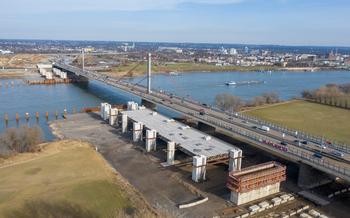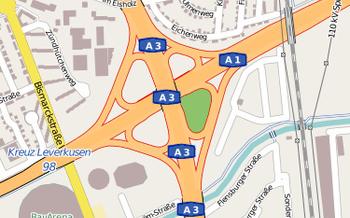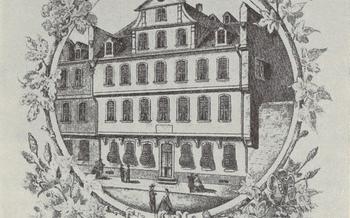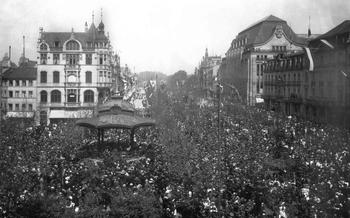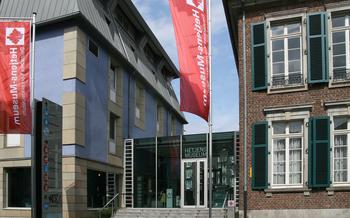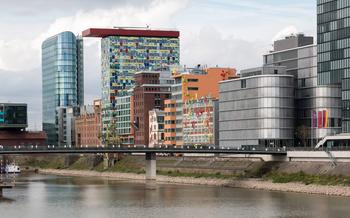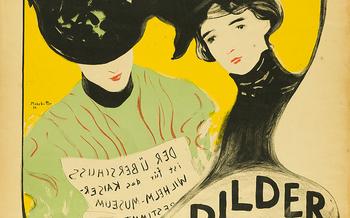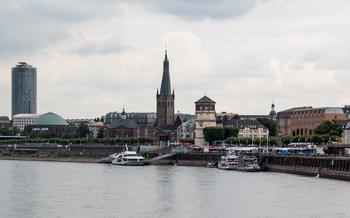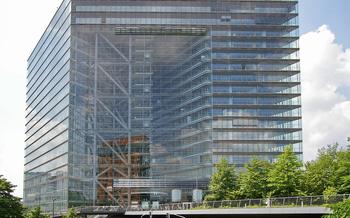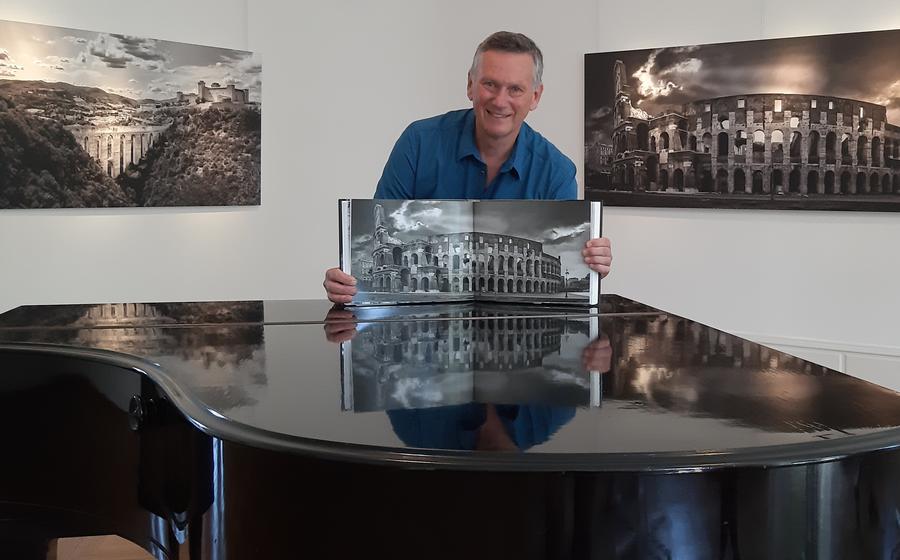
Goethe Museum
- Historical Significance
- Location and Accessibility
- Architectural Design
- Guided Tours and Educational Programs
- Interactive Displays and Multimedia Experiences
- Research Facilities and Library
- Special Events and Cultural Programs
- Accessibility for Visitors with Disabilities
- Sustainability and Environmental Initiatives
- Photography and Social Media Policy
- Nearby Attractions and Points of Interest
- Budget and Cost Considerations
- Insider Tip
Historical Significance
The Goethe Museum in Düsseldorf offers a fascinating journey into the life and works of Johann Wolfgang von Goethe, Germany's revered writer, poet, and thinker. This cultural landmark, recognized as a UNESCO World Heritage Site, preserves and celebrates Goethe's legacy, showcasing his profound contributions to German literature and culture.
As you step through the museum's doors, you embark on an exploration of Goethe's intellectual and creative world. Immerse yourself in the history of the museum, which dates back to 1952, and learn how it has become a cornerstone in preserving Goethe's heritage for generations to come.
Through engaging exhibits and displays, the museum sheds light on Goethe's literary masterpieces, his scientific inquiries, and his philosophical insights. Discover the profound impact he had on the Sturm und Drang movement, Weimar Classicism, and the Romantic era, leaving an indelible mark on the cultural landscape of Germany and beyond.
Location and Accessibility
The Goethe Museum is conveniently located in the heart of Düsseldorf, at Jacobistraße 2, just a short walk from the Königsallee shopping street and the Hofgarten park. The museum is easily accessible by public transportation, with several bus routes stopping nearby and the Heinrich-Heine-Allee U-Bahn station located just a few minutes away.
For those arriving by car, there are several paid parking garages in the vicinity, including the Königsallee Tiefgarage and the Heinrich-Heine-Allee Tiefgarage.
The Goethe Museum is open from Tuesday to Sunday, with extended hours on Thursdays. Please visit the museum's official website for the most up-to-date information on hours of operation and any seasonal variations.
Architectural Design
The Goethe Museum in Düsseldorf stands as a testament to the city's rich cultural heritage, its architectural beauty echoing the elegance and sophistication of the 18th century. The museum's classical facade, adorned with intricate carvings and symmetrical columns, invites visitors to step back in time and immerse themselves in the world of Johann Wolfgang von Goethe.
The building's history is as captivating as the exhibits it houses. Originally constructed in 1752, the structure underwent several renovations and expansions over the years, each reflecting the changing tastes and architectural styles of the era. In 1926, the building was meticulously restored to its original splendor, preserving its historical charm while incorporating modern amenities to enhance the visitor experience.
Inside, the museum's elegant interior reflects the grandeur of the Enlightenment period. Visitors are greeted by a grand staircase that leads to a series of spacious galleries, each adorned with intricate moldings, high ceilings, and gleaming parquet floors. The atmosphere is one of quiet contemplation, providing the perfect setting to explore Goethe's life and work.
The Goethe Museum seamlessly blends historical charm with modern functionality. Recent renovations have introduced state-of-the-art lighting systems and interactive displays, ensuring that visitors can engage with Goethe's legacy in a dynamic and immersive way. The museum's unique ambiance and atmosphere transport visitors to another era, allowing them to fully appreciate the genius and influence of one of Germany's most celebrated literary figures.
Guided Tours and Educational Programs
The Goethe Museum offers guided tours in various languages, providing an in-depth exploration of Goethe's life and works. These tours are led by knowledgeable guides who share insights and anecdotes about Goethe's literary genius and his profound influence on German culture. Visitors can choose from a variety of tours, including general introductions, thematic explorations, and specialized tours for students and scholars.
In addition to guided tours, the museum conducts a range of educational programs and workshops designed to engage visitors of all ages and interests. These programs include lectures, workshops, and interactive activities that delve into different aspects of Goethe's life and work. The museum's educational offerings aim to promote a deeper understanding of Goethe's literary legacy and its relevance to contemporary society.
Families visiting the museum can participate in special programs designed to make learning about Goethe fun and interactive for children. These programs often include storytelling sessions, hands-on activities, and creative workshops that bring Goethe's works to life for young minds.
For researchers and scholars, the Goethe Museum offers a variety of resources and programs. The museum's research facilities provide access to a wealth of primary sources, including Goethe's manuscripts, letters, and personal effects. The museum's library houses an extensive collection of Goethe-related literature, research materials, and rare editions of his works.
Overall, the guided tours and educational programs offered by the Goethe Museum enhance the visitor's understanding of Goethe's life and work. These programs provide a platform for learning, exploration, and engagement, making the museum a vibrant center for Goethe scholarship and cultural exchange.
Interactive Displays and Multimedia Experiences
The Goethe Museum offers a range of interactive displays and multimedia experiences that enhance the visitor's engagement with Goethe's works and ideas. These technologies bring Goethe's world and literary genius to life, creating a more immersive and memorable experience for visitors of all ages.
Among the interactive highlights is a virtual reality experience that allows visitors to step into Goethe's study and immerse themselves in his creative process. Through this virtual journey, visitors can gain a deeper understanding of Goethe's inspirations, influences, and the challenges he faced as a writer and thinker.
Another interactive feature is a multimedia timeline that showcases Goethe's life and accomplishments in a dynamic and engaging way. Visitors can explore key events, milestones, and turning points in Goethe's personal and professional life, gaining a comprehensive overview of his remarkable journey.
The museum also features interactive touchscreens that provide visitors with in-depth information about Goethe's works, his contemporaries, and the cultural and historical context in which he lived. These interactive elements enhance the visitor's understanding of Goethe's writings and their significance in the broader landscape of German literature.
These interactive displays and multimedia experiences are designed to engage visitors, stimulate curiosity, and foster a deeper appreciation for Goethe's legacy. Whether it's through virtual reality, multimedia timelines, or interactive touchscreens, the Goethe Museum provides a modern and innovative approach to showcasing the life and works of this literary giant.
Research Facilities and Library
The Goethe Museum houses a wealth of resources for scholars, researchers, and students of German literature. The museum's research facilities include a library, an archive, and a reading room. The library contains an extensive collection of Goethe-related literature, including first editions of his works, critical studies, and biographies. The archive holds a vast collection of manuscripts, letters, and other documents related to Goethe's life and work. The reading room provides a quiet and comfortable space for researchers to conduct their studies.
Special Events and Cultural Programs
The Goethe Museum is not just a repository of Goethe's legacy; it is also a vibrant cultural hub that hosts a variety of special events, cultural programs, and lectures throughout the year. These events are designed to promote Goethe's work, foster cultural exchange, and engage visitors with the museum's rich collection.
One of the highlights of the museum's cultural calendar is the annual Goethe Festival. Held in August, the festival features a series of events, including poetry readings, concerts, film screenings, and discussions, all centered around Goethe's life and work. Visitors can immerse themselves in the world of Goethe and explore his influence on literature, art, and philosophy.
In addition to the Goethe Festival, the museum also hosts regular lectures, workshops, and symposia. These events cover a wide range of topics related to Goethe and his contemporaries, such as German literature, history, and culture. Visitors can learn from renowned scholars and experts, engage in discussions, and gain new insights into Goethe's work and its significance.
The Goethe Museum is also a popular venue for concerts, performances, and exhibitions. The museum's elegant auditorium provides an intimate setting for musical recitals, chamber concerts, and theatrical performances. Visitors can enjoy a variety of musical genres, from classical to contemporary, while surrounded by the museum's beautiful collection.
These special events and cultural programs not only enrich the visitor's experience but also contribute to the museum's mission of preserving and promoting Goethe's legacy. By offering a diverse range of events, the Goethe Museum ensures that there is something for everyone, whether they are long-time Goethe enthusiasts or first-time visitors.
Accessibility for Visitors with Disabilities
The Goethe Museum is committed to providing an accessible and inclusive environment for visitors of all abilities. The museum features a number of accessibility features to ensure that everyone can enjoy a comfortable and enjoyable visit.
The museum is wheelchair accessible, with ramps and elevators located throughout the building. Accessible restrooms are also available on each floor. The museum staff is trained to assist visitors with disabilities and can provide additional accommodations upon request.
The museum also offers a variety of programs and services specifically designed for visitors with disabilities. These include audio tours, tactile exhibits, and sign language interpreters. The museum's website also provides information about accessibility features and services in multiple languages.
The Goethe Museum's commitment to accessibility extends beyond its physical facilities. The museum also strives to make its programs and exhibitions accessible to visitors with cognitive or sensory impairments. The museum offers a variety of educational programs that are designed to be inclusive of all learners, and it also provides materials in a variety of formats, including large print, Braille, and audio.
The Goethe Museum is a welcoming and inclusive space for visitors of all abilities. The museum's accessibility features and services ensure that everyone can enjoy a meaningful and enriching visit.
Sustainability and Environmental Initiatives
The Goethe Museum is committed to preserving Goethe's legacy while also protecting the environment. The museum has implemented several sustainability initiatives to reduce its carbon footprint and promote environmental responsibility.
The museum has installed energy-efficient lighting systems, insulation, and heating and cooling systems to minimize energy consumption. It also uses renewable energy sources, such as solar panels, to generate electricity. The museum has also implemented a waste reduction program, which includes recycling and composting.
The Goethe Museum is recognized for its sustainability efforts. It has received several awards, including the German Museum Association's Green Museum Award in 2020. The museum's commitment to sustainability demonstrates its dedication to preserving Goethe's legacy while protecting the environment for future generations.
Photography and Social Media Policy
The Goethe Museum welcomes visitors to capture their experiences through photography and videography, provided that they adhere to the museum's guidelines. Flash photography is generally prohibited within the exhibits to protect the delicate artifacts from damage. However, visitors are encouraged to share their photos and videos on social media using the designated hashtags to spread the word about the museum and its collections. The museum also maintains active social media channels, where visitors can find updates on upcoming events, exhibitions, and educational programs, as well as engaging content related to Goethe's life and work.
Nearby Attractions and Points of Interest
Beyond the Goethe Museum, Düsseldorf offers a plethora of cultural and historical attractions to satisfy every traveler's curiosity. A short stroll from the museum, visitors can immerse themselves in the vibrant Königsallee shopping street, renowned for its elegant boutiques, international brands, and delightful cafes. Just a stone's throw away lies the Hofgarten park, a tranquil oasis with sprawling lawns, serene ponds, and majestic sculptures, providing a respite from the city's hustle and bustle.
For those seeking a deeper dive into art and culture, the Kunstpalast museum beckons with its impressive collection of paintings, sculptures, and decorative arts from various eras. The NRW-Forum Düsseldorf, a contemporary art institution, showcases thought-provoking exhibitions that challenge and inspire visitors.
Düsseldorf's rich history is unveiled at the Stadtmuseum, where captivating exhibits narrate the city's evolution from a small fishing village to a thriving metropolis. The Schlossturm, a 13th-century tower, stands as a testament to Düsseldorf's medieval past and offers panoramic city views from its observation deck.
To experience Düsseldorf's vibrant culinary scene, head to the Carlsplatz market hall, a foodie haven brimming with fresh produce, artisanal cheeses, and mouthwatering delicacies from around the world. Savor the flavors of traditional German cuisine at one of the city's many cozy restaurants or indulge in international culinary delights at the numerous ethnic eateries.
Whether you seek cultural enrichment, historical exploration, or culinary adventures, Düsseldorf has something to offer every traveler. Combine your visit to the Goethe Museum with these nearby attractions to create a personalized itinerary that caters to your unique interests and passions. Embrace the city's charm and discover its hidden gems as you delve into its rich cultural tapestry.
Budget and Cost Considerations
Visiting the Goethe Museum is a relatively affordable cultural experience. Admission fees are reasonable, with discounts available for students, seniors, and families. Guided tours and educational programs may have additional costs, but these are typically optional.
To save money, consider purchasing a Düsseldorf Card, which offers free or discounted admission to many attractions, including the Goethe Museum. You can also take advantage of free admission on the first Sunday of every month.
When budgeting for your trip, factor in additional expenses such as souvenirs, dining, and transportation. Düsseldorf has a variety of dining options to suit all budgets, from casual cafes to fine-dining restaurants. Public transportation is efficient and affordable, making it easy to get around the city.
Here are some tips for saving money while visiting the Goethe Museum and Düsseldorf:
- Book your tickets online in advance to avoid queues and take advantage of any online discounts.
- Bring your student ID or senior citizen card if you are eligible for a discount.
- Take advantage of free admission on the first Sunday of every month.
- Pack a lunch or snacks to save money on food and drinks.
- Use public transportation to get around the city.
- Look for free events and activities, such as concerts, exhibitions, and walking tours.
Insider Tip
As you wander through the Goethe Museum, keep an eye out for a hidden treasure—a small, unassuming room tucked away in a corner of the museum. This room houses a collection of Goethe's personal effects, including his writing desk, his favorite armchair, and even a lock of his hair. These intimate objects offer a glimpse into the life of this literary giant and provide a tangible connection to his creative process. Don't miss this opportunity to step into Goethe's world and experience his presence in a deeply personal way.
After your visit to the museum, take a stroll through the nearby Hofgarten park, a beautiful green oasis in the heart of Düsseldorf. Relax by the tranquil waters of the Schwanenspiegel pond, admire the elegant sculptures, and soak up the peaceful atmosphere. This is the perfect place to reflect on your visit to the Goethe Museum and to appreciate the enduring legacy of one of Germany's most beloved writers.
